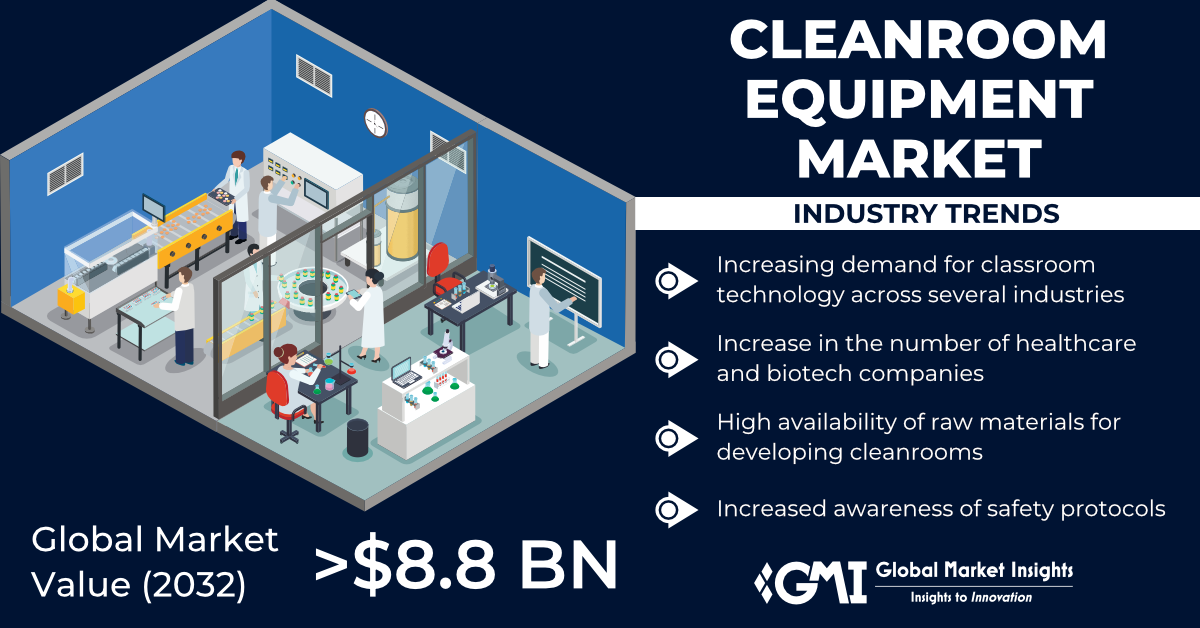Selbyville, Delaware,, June 05, 2024 (GLOBE NEWSWIRE) --
The cleanroom equipment market revenue to cross USD 8.8 billion by 2032, as reported in a research study by Global Market Insights Inc.
Cleanroom equipment plays a leading role in this, providing solutions that minimize resource consumption and reduce waste production and energy consumption. Companies in various sectors are increasingly adopting cleanroom technologies not only to meet regulatory requirements but also to meet sustainability goals. This change to sustainability helps improve the company's image while contributing to long-term environmental protection, thus contributing to the continued growth of the cleanroom equipment market.
Request for a sample of this research report @ https://www.gminsights.com/request-sample/detail/7816
The air jets segment will register rapid growth through 2032, as air jets use high-speed air jets to remove particles from surfaces, preventing contaminants from entering a controlled environment. The demand for air jets could grow significantly due to their effectiveness in maintaining strict levels of cleanliness. Industries such as pharmaceuticals, biotechnology, and microelectronics are increasingly adopting air jets as part of their pollution control strategies. Their ability to improve operational efficiency by reducing the ingress of contaminants makes air jets essential to maintaining the integrity of the cleanroom environment.

The aerospace industry segment will have a reasonable share of the cleanroom equipment market through 2032, as the complexity of aerospace systems and the increasing demand for precision components have made the need for pollution-free production environments clearer. Cleanroom equipment, including air jets, laminar flow equipment, and HEPA filters, is essential in the assembly and maintenance of aerospace components, where even microscopic contaminants can cause critical failures. Continued advancement in aerospace technology and global expansion of the industry could increase the demand for cleanroom equipment in this segment.
Asia-Pacific cleanroom equipment market will capture a decent revenue share by 2032, fueled by rapid industrialization, growing pharmaceutical and biotechnology sectors, and significant investment in electronics and semiconductor manufacturing. Countries such as China, India, and Japan are pioneering the adoption of cleanroom technology due to strict regulatory standards and the need for high-quality production environments. Growing awareness of the importance of pollution control in the healthcare and food industry will further support market growth in this region. In addition, favorable government policies and increasing foreign direct investment create a favorable environment for market expansion.
Leading companies in the cleanroom equipment market include Kimberly-Clark Corporation, Terra Universal, Inc., Illinois Tool Works Inc., Azbil Corporation, DuPont, Taikisha Ltd., Ardmac Ltd, Clean Air Products, Royal Imtech N.V., and Labconco Corporation. The key growth strategies of these players are product innovation and diversification to meet evolving industry standards and customer demands.
In addition, strategic partnerships, mergers, and acquisitions are common tactics to expand market presence and enter new geographies. Some companies focus on improving their service offering and after-sales support to ensure customer satisfaction and loyalty. In addition, investments in research and product development are crucial to the development of cutting-edge technologies that improve the efficiency and reliability of products. In addition, operational efficiency initiatives such as lean manufacturing practices and supply chain optimization help companies streamline processes and reduce costs, ultimately increasing profitability and sustainable market growth.
Make an inquiry for purchasing this report @ https://www.gminsights.com/inquiry-before-buying/7816
Partial chapters of report table of contents (TOC):
Chapter 1 Methodology & Scope
1.1 Cleanroom equipment market scope & definition
1.2 Base estimates & calculations
1.3 Forecast calculation
1.4 Data sources
1.4.1 Primary
1.4.2 Secondary
1.4.2.1 Paid sources
1.4.2.2 Public sources
Chapter 2 Executive Summary
2.1 Cleanroom equipment market 3600 synopsis, 2018 - 2032
2.2 Business trends
2.3 Regional trends
2.4 Equipment trends
2.5 Type of cleanroom trends
2.6 Application trends
Chapter 3 Cleanroom Equipment Industry Insights
3.1 Industry ecosystem analysis
3.2 Raw material analysis
3.3 Key news and initiatives
3.3.1 Partnership/Collaboration
3.3.2 Merger/Acquisition
3.3.3 Investment
3.3.4 Product launch & innovation
3.4 Regulatory landscape
3.5 Impact forces
3.5.1 Growth drivers
3.5.2 Industry pitfalls & challenges
3.6 Consumer buying behavior analysis
3.7 Growth potential analysis
3.8 Porter's analysis
3.9 PESTEL analysis
Browse more industrial machinery industry reports @ https://www.gminsights.com/industry-reports/industrial-machinery
Related Reports:
Cleanroom Technology Market Size - By Product (Equipment, Consumables), By Type (Conventional Cleanrooms, Modular Cleanrooms, Pass-Through Cleanrooms, Softwall Cleanrooms), By End-use (Pharmaceutical Industry), & Forecast, 2023 – 2032
https://www.gminsights.com/industry-analysis/cleanroom-technology-market
Cleanroom Lighting Market Size - By Component (Hardware, Software, Services), By Fixture Type (Teardrop, Recessed, Surface Mount), By Types of Lighting, By Application (Pharma, Medical Devices, F&B, Biotech, Sterile Compounding, Electronics) & Forecast 2024 – 2032
hhttps://www.gminsights.com/industry-analysis/cleanroom-lighting-market
About Global Market Insights Inc.
Global Market Insights Inc., headquartered in Delaware, U.S., is a global market research and consulting service provider, offering syndicated and custom research reports along with growth consulting services. Our business intelligence and industry research reports offer clients with penetrative insights and actionable market data specially designed and presented to aid strategic decision making. These exhaustive reports are designed via a proprietary research methodology and are available for key industries such as chemicals, advanced materials, technology, renewable energy, and biotechnology.
